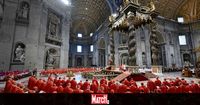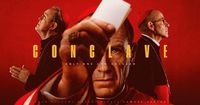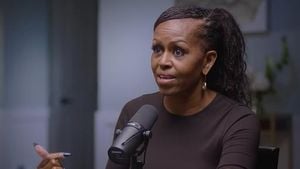A new political thriller titled Conclave, featuring Ralph Fiennes, has recently premiered on Prime Video in India, coinciding with the global anticipation surrounding the conclave to elect a successor to the late Pope Francis. This film, based on Robert Harris's 2016 novel, provides a gripping narrative centered on the secretive process of selecting a new pope.
Directed by Edward Berger, Conclave has garnered significant attention, especially after the death of Pope Francis on April 21, 2025. The film explores the intricate dynamics within the Vatican as Cardinal Thomas Lawrence, portrayed by Fiennes, navigates a web of secrets and conspiracies following the unexpected passing of the beloved pontiff.
As the world watches the unfolding events, the film's release has sparked a surge in interest. According to data from Luminate, viewership skyrocketed by 283%, jumping from 1.8 million minutes on April 20 to nearly 6.9 million minutes on April 21, the day after the pope's death. This dramatic increase highlights how real-world events can influence media consumption.
The film's narrative resonates with many cardinals who are participating in a conclave for the first time. Some have even turned to Conclave for insights into the complex procedures they are about to undertake. "Some have seen it in the movies," admitted a religious figure involved in the conclave, reflecting the film's impact on those unfamiliar with the sacred tradition.
As the conclave commenced on May 7, 2025, with 133 cardinals gathering in the Sistine Chapel, the film's portrayal of the election process was put to the test. The conclave is steeped in centuries-old traditions and protocols, designed to ensure the utmost secrecy. This aspect of the film has been praised for its accuracy, as it depicts the isolation of cardinals who have no contact with the outside world until a new pope is elected.
However, the film does take creative liberties. While it captures the essence of the conclave, the intricate discussions and scandals depicted may not fully reflect reality. The church has faced numerous allegations over the years, but the actual debates during the conclave are primarily focused on the future direction of the Church, interspersed with prayer and reflection.
As cardinals engage in intense discussions behind closed doors, they are reminded of their spiritual responsibilities. The film, while thrilling, may not completely convey the solemnity and devotion that underpin the conclave process. Viewers are left to ponder the balance between the film's dramatization and the genuine reverence of the papal election.
Despite the discrepancies, Conclave serves as a fascinating lens through which to view the complexities of papal elections. The film's release has sparked conversations about transparency and the role of tradition in an ever-evolving world. The recent events in the Vatican have only amplified this discourse, making the film's themes more relevant than ever.
As the conclave unfolds, the world watches closely, eager to see who will emerge as the 267th pope. The anticipation surrounding this pivotal moment in the Catholic Church's history is palpable, and Conclave has undoubtedly played a role in shaping public interest.
In summary, while Conclave offers a thrilling depiction of the papal election process, it also raises important questions about the intersection of faith, tradition, and modernity. The film's resurgence in popularity is a testament to the enduring intrigue surrounding the Vatican and its secrets, as the world awaits the outcome of the conclave.





